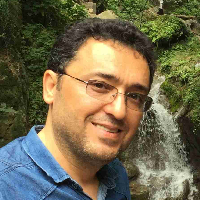Non point Source Pollution Modeling and Critical Area Priority for Environmental management of Tajan Watershed
Author(s):
Abstract:
Non-point pollution are an important factor in determining water quality and eutrophication of fresh water. The principle causes of this issue is high concentrations of nutrients in the water especially nitrogen and phosphorus. Change of land use particularly affected on water nitrate load. Therefore, understanding the correlations between land use and nitrate pollutant is a priority in order to assess pollutants loading and predicting the impact on surface water quality.The soil and water assessment tool (SWAT (was used to simulate nitrate loads in different land cover types in Tajan watershed. Annual nitrate of in output of Tajan watershed varied from 89350 kg to 31070 kg in period from 2001 to 2013. The contributing share of each land use/land cover )LULC( shows nitrate pollutant produced by grassland (5/7%) and forest (29%) are less than those produced by agricultural land )64%(. Agricultural land was identified as the main source of nitrate pollution, and paddy fields and orchards had the most intensive soluble nitrate loss in springer and summer respectively Also, critical subwatersheds for management priority were characterized. The results of this study could be a useful guide in order to preserve and protect the ecosystem of Tajan watershed from more degradation and promote sustainable development in this region.
Keywords:
Language:
Persian
Published:
Iranian Journal of Eco Hydrology, Volume:3 Issue: 3, 2016
Pages:
455 to 464
https://www.magiran.com/p1646841
سامانه نویسندگان
مقالات دیگری از این نویسنده (گان)
-
Utilization of Fourier Transform and Landscape Metrics for Landscape Health Assessment
Niloufar Islamzadeh *, Alireza Mikaieli Tabrizi, Abdolrassoul Salmanmahiny, Rasul Ghorbani
Environmental Researches, -
Investigation of the distribution of plant species for systematic mapping of urban habitats with an ecological approach (Case study: Districts 9 and 11 of Mashhad City)
Raziyeh Donyavi, Alireza Mikaeili Tabrizi *, Abdolrasoul Salmanmahini, Azadeh Karimi
Journal of Environmental Studies,


